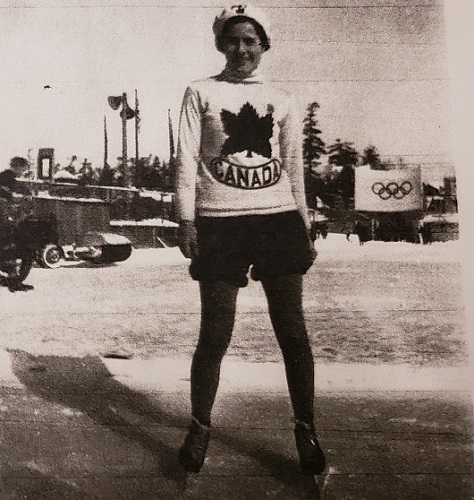
A few years back, I penned a column meant to open up a discussion surrounding Sudbury Olympians. More specifically, I presented a variety of factors that should be involved in helping to determine whether a given athlete should actually be allowed entry into this rather elite club or not.
As expected, my musings prompted some local chatter – and continues to do so, from time to time. In fact, thanks to the efforts of long-time Sudbury media type Vicki Gilhula, I was launched into a more intense research of the interesting history of Alex and Florence Hurd.
A speed skater at the 1932 Winter Olympics in Lake Placid, Alex Hurd has long been recognized as the earliest candidate for the title of Sudbury Olympian, his silver and bronze medal winning performances (1500m/500m races) coming some 16 years prior to the entry of Sudbury Technical School graduate Leo Roininen in the javelin competition at the 1948 Summer Games in London.
Still, despite a glut of wonderful information that can be found on the worldwide web and the ease with which various tidbits may be Googled, there honestly are precious few details on-line regarding the connection to Sudbury that the Hurd siblings enjoyed.
As it turns out, that glut of additional information was literally sitting right in our own backyard.
Now living comfortably in the neighbourhood of Gatchell but with plenty of ties to the Long Lake area, Joyce Camus is the daughter of Florence Hurd, niece to Alex Hurd, and the collector of much of the family legacy in the sport of speed skating.
It was through her that I was recently made aware that the Hurds – parents as well as Florence, Alex and the eldest son, Clarence – were what would have been deemed as a “Salvation Army” family, her grandfather working in the service of same. For those who know that era well, this vocation would carry with it plenty of regular relocation.
Born in North Sydney (Nova Scotia), Florence initially started skating with her brother (Alex) in Moncton. In fact, years later, it was Florence who initiated any kind of connection with northern Ontario, agreeing to attend and provide a demonstration of speed skating for the opening of Stanley Stadium in 1935 or so.
It was here that she would meet her husband to be, Robert McIntyre, with the couple settling in the Sudbury region for the balance of their adult lives. Yet it was her accomplishments in the years leading up to this chance meeting that would lend credence to the argument that there is perhaps a revision required to the archives of Sudbury Olympic sport history.
A very talented skater in her own right, Florence actually joined Alex in Lake Placid in 1932, though the female version of speed skating was included only on a demonstration-sport basis at the time. This was the pinnacle of a sibling sojourn that had been a decade or so in the making.
While both Alex and Flossie, as Florence came to be known in skating circles, “fooled around” on the ovals as youngsters, it wasn’t until the Hurds came to move to Toronto in 1925 (and then London, Ontario) that racing entered the mix in a big way.
Canadian Junior champions in 1928, the pair were clearly among the very best in the country as 1932 approached. Beyond III Olympic Winter Games (the first would be hosted in Charmonix – France – in 1924), the tandem continued to excel.
In 1933, Alex captured gold at the North American Indoor Championships, subsequently joining the likes of Frank Stack and Herb Flack in Norway and enjoying a certain amount of international success.
Although the road that Florence would travel featured a few more potholes along the way, she truly garnered attention in 1935, defeating American Dot Francy in a three-quarter mile semi-final, the latter having broken a pair of world records previously held by Canadian Lela Brooks.
By the time that she took to the ice for the 1935 North American meet, Hurd has elevated her skills enough to earn an overall second place finish, a ranking that carried with it a berth on the 1936 Canadian Olympic team – as did her brother Alex, who was to captain the speed skating team.
Unfortunately, funding restrictions would mean that Canada did not send a speed skating contingent to Garmisch-Partenkirchen (Germany) – though it did little to deter the search for on-ice excellence of the locals. In February of 1936, Florence Hurd set a new world record in a one-mile race in Wisconsin, clocking a time of 3:07.60.
But it was in the years that lie ahead where she would truly leave an indelible mark on the Sudbury sport community, doing everything in her power to grow her sport in the nickel city. For years to come, Hurd McIntyre could be found looping around the oval of Queen’s Athletic Field, far more often for simple recreation than any future glory.
She would remain in Sudbury until the time of her passing in 1989, whereas Alex would head state-side to continue his skating, living in St Louis for a while before eventually calling Tampa Bay, Florida home.
Armed with this glut of new knowledge, it seems clear that: 1) Florence Hurd absolutely deserves the distinction of being recognized as a Sudbury Olympian, arguably even more than her more acclaimed brother, even if the sport was still in “demonstration sport” status at the time and 2) there is also a pretty good case to be made that Florence – and potentially even as a package deal with Alex – be considered for a future class of the Sudbury Sports Hall of Fame.
Well, that’s my opinion anyways.







